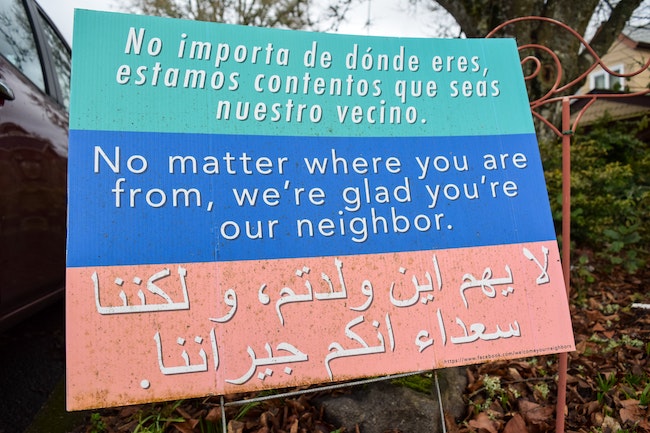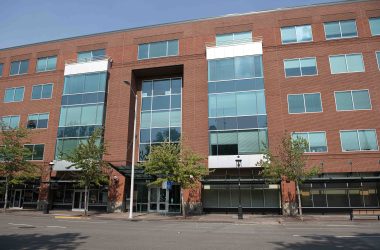 A sign outside a home in Salem’s Fairmount neighborhood (Saphara Harrell/Salem Reporter)
A sign outside a home in Salem’s Fairmount neighborhood (Saphara Harrell/Salem Reporter)
Advocates for refugees in Salem are urging Marion and Polk counties to keep the door open to resettle refugees as local governments face an approaching deadline to accept refugees going forward.
As of this week, neither Marion nor Polk counties had made a decision. Both said they had questions to answer about what a decision, one way or the other, would mean.
The decision won’t impact the few hundred refugees who have settled in Salem in the past four years, but could halt new refugee arrivals from countries including the Democratic Republic of the Congo, South Sudan, Iraq and Ukraine.
On average, about one new refugee family per month has come to Salem since late 2015, said Anya Holcomb, co-founder of Salem for Refugees, a local network of churches, businesses, social service organizations and volunteers. That’s when resettlement agencies began looking outside the Portland area because of climbing housing costs.
Refugee resettlement has historically been a federal effort. The U.S. State Department vets refugees who have fled conflict or persecution in their home countries.
A private agency under contract with the U.S. government handles the logistics of bringing the refugees to their new home and helping them find housing and work.
Once settled, refugees must pay back the cost of their plane tickets to the U.S. government. They eventually become eligible for green cards and eventually U.S. citizenship.
Local governments usually aren’t directly involved in resettlement. But in September, President Donald Trump issued an executive order saying states and counties must decide whether they want to keep accepting refugees. The deadline to respond is Tuesday, Jan. 21.
Gov. Kate Brown answered on social media in October, saying Oregon statewide would continue to resettle refugees. But the nine Oregon counties where refugees have been resettled in the past must also sign on to continue accepting new arrivals.
Catholic Charities of Oregon, the main agency that has resettled refugees in Salem, is leading a statewide effort to get counties on board. Matthew Westerbeck, the group’s director of refugee services, said Clackamas County has agreed, and he expects to hear from Multnomah, Washington and Marion counties soon.
Salem for Refugees is also urging Marion and Polk counties to continue accepting refugees.
Doug Holcomb, the group’s co-founder, urged members to spread the word about the importance of continuing to accept refugees to Salem. Many people don’t know much about refugee resettlement, he said, until they meet a refugee living in Salem.
“Often people have preconceived ideas and they meet people and go, ‘Oh, they’re just like us,” he said at a group meeting this week.
Westerbeck said counties have been supportive, though many are confused because they’re not directly involved.
“It’s taking a little bit of time to understand what’s being asked of them,” he said.
Marion County commissioners said through a spokesperson they first wanted to know how the governor’s answer impacted their own. And they wondered how their decision would impact cities in their jurisdiction, such as Salem and Keizer. They sent letters to city leaders and asked for responses by Jan. 14.
“The information we’ve received from refugee groups was that primarily that’s where refugees in Marion County settle — primarily Salem with a few in Keizer,” spokeswoman Jolene Kelly said. “So we wanted to make sure we had their feedback.”
Leaders in Polk County weren’t aware a decision needed to be made, they said.
“We’ve had no communication from the state, federal or even (the Association of Oregon Counties) on what to do on this,” said Commissioner Craig Pope. “That’s the first issue for me.”
Having learned earlier this week that a decision needed to be made, Pope said county officials are researching. They say their main question is financial: would saying yes to resettlement cost public dollars?
“We flat don’t — as combined communities in the Mid-Willamette Valley — have the resources to solve the problems we have on the streets today with homeless folks and people looking for help,” he said.
Greg Hansen, the county administrator, said it’s possible that the commissioners would make no decision.
“Obviously not taking action is a de facto no,” Hansen said.
If Marion signs on and Polk doesn’t, Westerbeck said resettlement agencies can continue placing refugees in the Salem area, so long as they initially live on the east side of the river.
Have a tip? Reporter Rachel Alexander: [email protected] or 503-575-1241. Reporter Troy Brynelson at 503-575-9930, [email protected] or @TroyWB.









